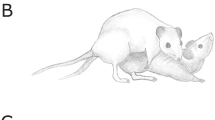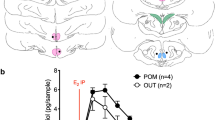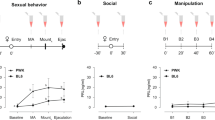Abstract
ELECTRICAL stimulation of certain parts of the limbic system of the mammalian brain produces erection of the penis1 and ablation of the hippocampus can increase the frequency of mountings2. This communication is concerned with the corollary that small lesions in the limbic system can also reduce male sexual activity.
This is a preview of subscription content, access via your institution
Access options
Subscribe to this journal
Receive 51 print issues and online access
$199.00 per year
only $3.90 per issue
Buy this article
- Purchase on Springer Link
- Instant access to full article PDF
Prices may be subject to local taxes which are calculated during checkout
Similar content being viewed by others
References
MacLean, P. D., and Ploog, D. W., J. Neurophysiol., 25, 29 (1962).
Kim, C., J. Comp. Physiol. Psychol., 53, 553 (1960).
Larsson, K., and Essberg, L., Gerontologia, 6, 133 (1962).
Hillarp, N.-Å., Acta Physiol. Scand., 14, 257 (1947).
Soulairac, M.-L., Ann. d'Endocrinol., 24, No. 3 Supp. (1963).
Author information
Authors and Affiliations
Rights and permissions
About this article
Cite this article
LARSSON, K., HEIMER, L. Mating Behaviour of Male Rats after Lesions in the Preoptic Area. Nature 202, 413–414 (1964). https://doi.org/10.1038/202413a0
Issue Date:
DOI: https://doi.org/10.1038/202413a0
This article is cited by
-
Epigenetic mechanisms are involved in sexual differentiation of the brain
Reviews in Endocrine and Metabolic Disorders (2012)
-
Lennart Heimer: in memoriam (1930–2007)
Brain Structure and Function (2008)
-
Colocalization of estrogen β-receptor messenger RNA with orphanin FQ, vasopressin and oxytocin in the rat hypothalamic paraventricular and supraoptic nuclei
Anatomy and Embryology (2003)
Comments
By submitting a comment you agree to abide by our Terms and Community Guidelines. If you find something abusive or that does not comply with our terms or guidelines please flag it as inappropriate.



